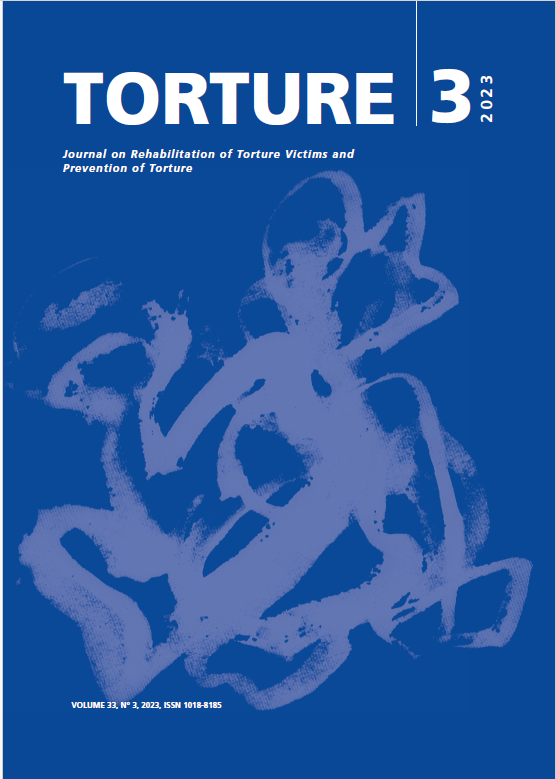Resilience in torture survivors: reflections, learnings and ways forward
DOI:
https://doi.org/10.7146/torture.v33i3.141912Keywords:
Torture, Torture survivors, Resilience, Resistance, Post-traumatic growthAbstract
The paper develops initial reflections on the possibility of resilience in torture survivors and how resilience would be defined in that case, who would be resilient and whether it is possible to learn to be resilient. The second part suggests a comprehensive list of individual and collective resilience mechanisms relevant during and after the experience of torture.
References
Amery, J. (1966). At the Mind’s Limits: Contemplations by a Survivor on Auschwitz and its Realities. Indiana University Press.
Babatunde, A. O. (2018). The efficacy of traditional cultural practices in the rehabilitation of victims of torture in Nigeria’s Niger Delta. Torture Journal, 28(3), 46–62. https://doi.org/10.7146/torture.v28i3.111184
Brinkman, I. (2000). Ways of Death: Accounts of Terror from Angolan Refugees in Namibia. In Africa (Vol. 70, pp. 1–24). https://doi.org/10.3366/afr.2000.70.1.1
EGE. (2020). Statement on European Solidarity and the Protection of Fundamental Rights in the COVID-19 Pandemic. 1–4. https://ec.europa.eu/info/publications/future-work-future-
Eggerman, M., & Panter-Brick, C. (2010). Suffering, hope, and entrapment: Resilience and cultural values in Afghanistan. Social Science and Medicine, 71(1), 71–83. https://doi.org/10.1016/j.socscimed.2010.03.023
Ewuoso, C., & Hall, S. (2019). Core aspects of ubuntu: A systematic review. South African Journal of Bioethics and Law, 12(2), 93–103. https://doi.org/10.7196/SAJBL.2019.v12i2.679
Hammad, J., & Tribe, R. (2021). Culturally informed resilience in conflict settings: a literature review of Sumud in the occupied Palestinian territories. International Review of Psychiatry, 33(1–2), 132–139. https://doi.org/10.1080/09540261.2020.1741259
Kadima Kadiangandu, J., Gauche, M., Vinsonneau, G., & Mullet, E. (2007). Conceptualizations of Forgiveness: Collectivist-Congolese Versus Individualist-French Viewpoints. Journal of Cross-Cultural Psychology, 38(4), 432–437. https://doi.org/10.1177/0022022107302312
Layne, C. M., Warren, J. S., Watson, P. J., & Shalev, A. (2007). Risk, vulnerability, resistance and resilience. In Handbook of PTSD. Science and practice. Guilford Press.
Leach, J. (2011). Survival psychology: The won’t to live. Psychologist, 24(1), 26–29.
Leunissen, J. M., De Cremer, D., Reinders Folmer, C. P., & van Dijke, M. (2013). The apology mismatch: Asymmetries between victim’s need for apologies and perpetrator’s willingness to apologize. Journal of Experimental Social Psychology, 49(3), 315–324. https://doi.org/10.1016/j.jesp.2012.12.005
Meari, L. (2014). Sumud: A palestinian philosophy of confrontation in colonial prisons. South Atlantic Quarterly, 113(3), 547–578. https://doi.org/10.1215/00382876-2692182
ODHAG. (1999). Informe Guatemala Nunca Mas. Arzobspado de Guatemala.
Semprun, J. (1996). La escritura o la vida. Alfaguara.
Soto Nolasco, M. (2023). Red de Personas Torturadas de Navarra: auto-organización y empoderamiento en la lucha contra el silencio. Torture Journal, 33(2), 64–84. https://doi.org/10.7146/torture.v33i2.137318
Steinberg, P. (1972). Speak you also. A Survivor’s reckoning. Picador. (In Spanish - Crónicas del Mundo oscuro; In French Chroniques d’ailleurs)
Viñar, M. N. (2005). The specificity of torture as trauma: the human wilderness when words fail. The International Journal of Psycho-Analysis, 86, 311–333.
Wagstaff, C. R. D., & Leach, J. (2015). The value of strength-based approaches in SERE and sport psychology. Military Psychology, 27(2), 65–84. https://doi.org/10.1037/mil0000066
Wilson, R. A. (2001). The Politics of Truth and Reconciliation in South Africa. Cambridge University Press. https://doi.org/10.1017/CBO9780511522291
Wyatt, Z. (2019). Trauma, Resilience and the Power of Human Connection: Reflections from the Field of Cambodia. American Journal of Applied Psychology, 8(2), 50. https://doi.org/10.11648/j.ajap.20190802.14
Wyatt, Z. (2023). Intergenerational Trauma in the Aftermath of Genocide. European Journal of Theoretical and Applied Sciences, 1(2), 72–78. https://doi.org/10.59324/ejtas.2023.1(2).07
Zraly, M., & Nyirazinyoye, L. (2010). Don’t let the suffering make you fade away: An ethnographic study of resilience among survivors of genocide-rape in southern Rwanda. Social Science and Medicine, 70(10), 1656–1664. https://doi.org/10.1016/j.socscimed.2010.01.017
Downloads
Published
How to Cite
Issue
Section
License
Copyright (c) 2023 Torture Journal

This work is licensed under a Creative Commons Attribution-NonCommercial-NoDerivatives 4.0 International License.
We accept that some authors (e.g. government employees in some countries) are unable to transfer copyright. The Creative Commons Licence Attribution-NonCommercial-NoDerivatives 4.0 International (CC BY-NC-ND 4.0) covers both the Torture Journal and the IRCT web site. The publisher will not put any limitation on the personal freedom of the author to use material contained in the paper in other works which may be published, provided that acknowledgement is made to the original place of publication.


